Biological and Evolutionary Approaches to Personality and Intelligence
VerifiedAdded on 2023/01/12
|7
|1348
|48
Report
AI Summary
This report delves into the concepts of personality and intelligence, comparing and contrasting biological and evolutionary approaches. The introduction defines personality and intelligence, setting the stage for a discussion of how biological factors, including genetics and mental health, and evolutionary adaptations shape individual behavior. The report highlights similarities, such as the influence of inherited traits, and differences, such as the focus on mental stability versus adaptation and survival. It explores how biological approaches emphasize the role of brain structure and function, while evolutionary approaches consider the impact of natural selection on behavior. The conclusion summarizes the key findings, emphasizing the complementary nature of these perspectives in understanding the complexities of human behavior. The report references multiple academic journals and books to support its arguments.
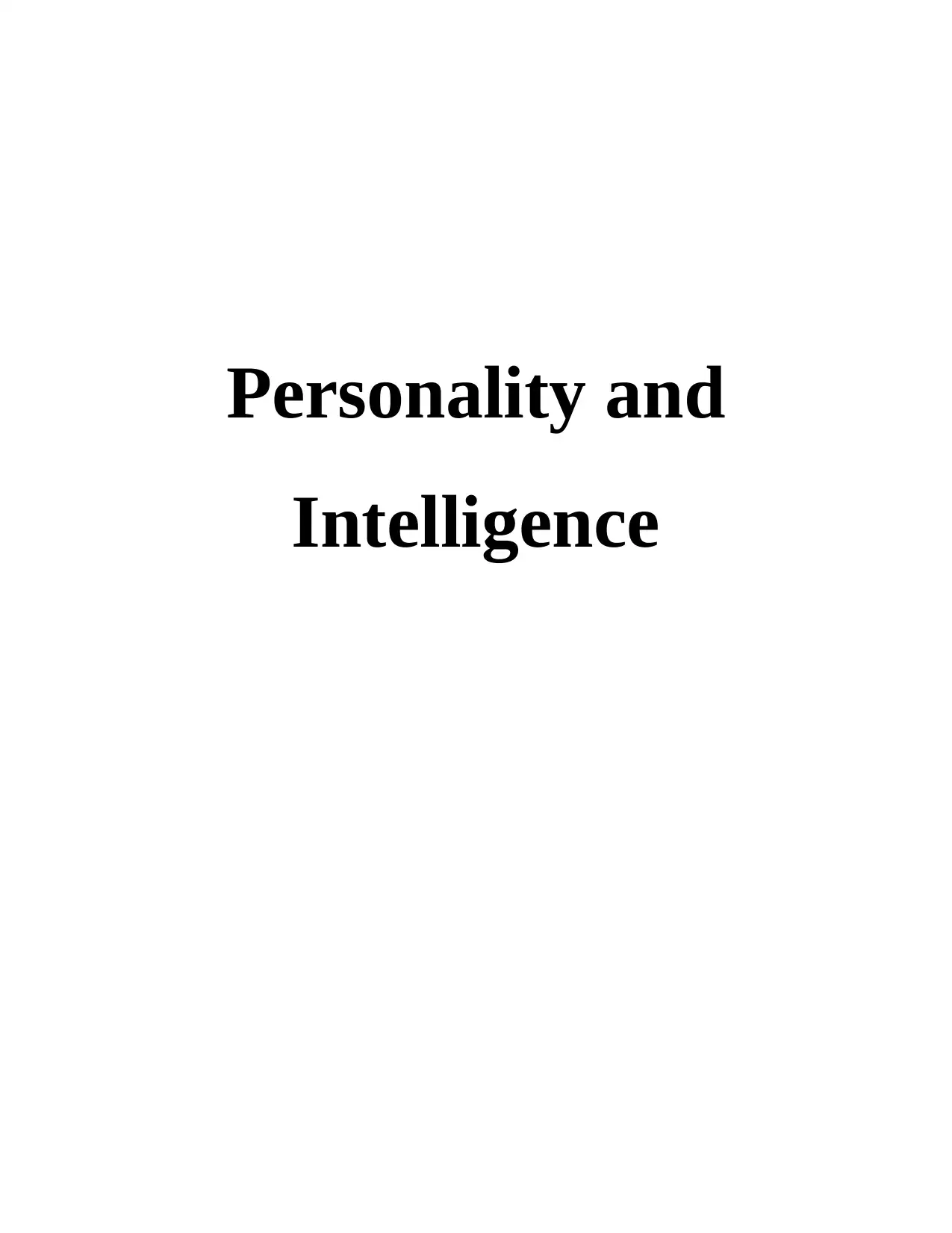
Personality and
Intelligence
Intelligence
Paraphrase This Document
Need a fresh take? Get an instant paraphrase of this document with our AI Paraphraser
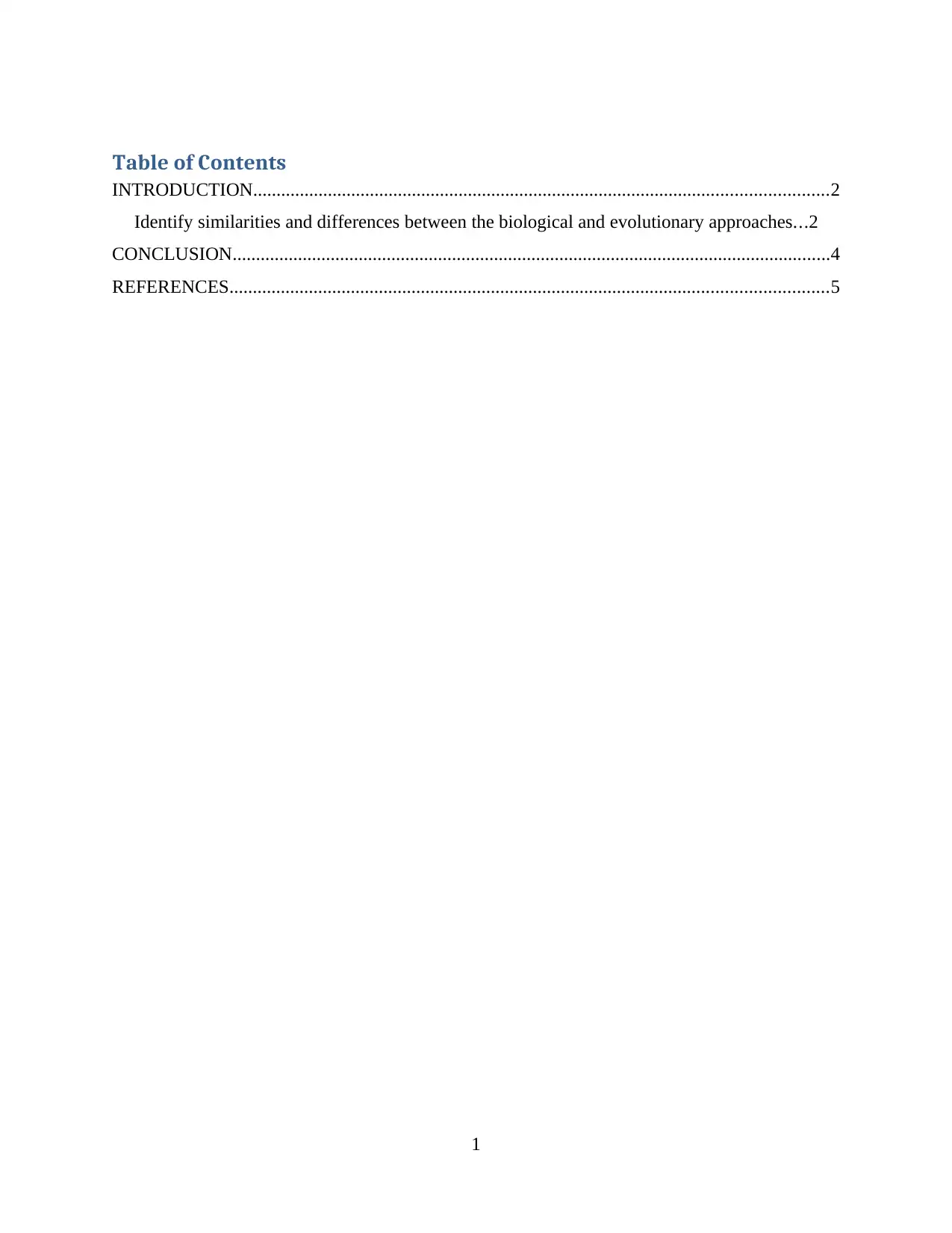
Table of Contents
INTRODUCTION...........................................................................................................................2
Identify similarities and differences between the biological and evolutionary approaches...2
CONCLUSION................................................................................................................................4
REFERENCES................................................................................................................................5
1
INTRODUCTION...........................................................................................................................2
Identify similarities and differences between the biological and evolutionary approaches...2
CONCLUSION................................................................................................................................4
REFERENCES................................................................................................................................5
1
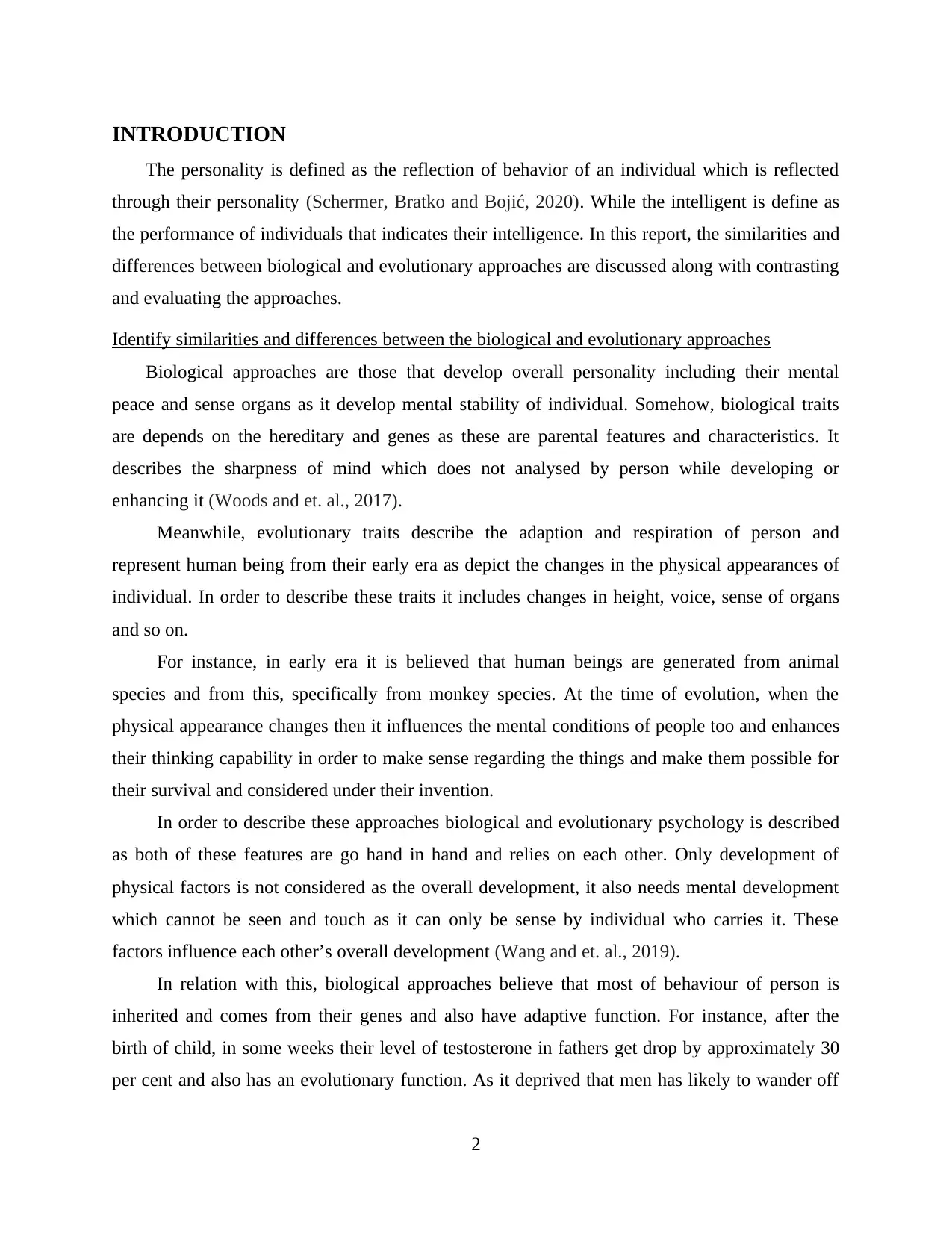
INTRODUCTION
The personality is defined as the reflection of behavior of an individual which is reflected
through their personality (Schermer, Bratko and Bojić, 2020). While the intelligent is define as
the performance of individuals that indicates their intelligence. In this report, the similarities and
differences between biological and evolutionary approaches are discussed along with contrasting
and evaluating the approaches.
Identify similarities and differences between the biological and evolutionary approaches
Biological approaches are those that develop overall personality including their mental
peace and sense organs as it develop mental stability of individual. Somehow, biological traits
are depends on the hereditary and genes as these are parental features and characteristics. It
describes the sharpness of mind which does not analysed by person while developing or
enhancing it (Woods and et. al., 2017).
Meanwhile, evolutionary traits describe the adaption and respiration of person and
represent human being from their early era as depict the changes in the physical appearances of
individual. In order to describe these traits it includes changes in height, voice, sense of organs
and so on.
For instance, in early era it is believed that human beings are generated from animal
species and from this, specifically from monkey species. At the time of evolution, when the
physical appearance changes then it influences the mental conditions of people too and enhances
their thinking capability in order to make sense regarding the things and make them possible for
their survival and considered under their invention.
In order to describe these approaches biological and evolutionary psychology is described
as both of these features are go hand in hand and relies on each other. Only development of
physical factors is not considered as the overall development, it also needs mental development
which cannot be seen and touch as it can only be sense by individual who carries it. These
factors influence each other’s overall development (Wang and et. al., 2019).
In relation with this, biological approaches believe that most of behaviour of person is
inherited and comes from their genes and also have adaptive function. For instance, after the
birth of child, in some weeks their level of testosterone in fathers get drop by approximately 30
per cent and also has an evolutionary function. As it deprived that men has likely to wander off
2
The personality is defined as the reflection of behavior of an individual which is reflected
through their personality (Schermer, Bratko and Bojić, 2020). While the intelligent is define as
the performance of individuals that indicates their intelligence. In this report, the similarities and
differences between biological and evolutionary approaches are discussed along with contrasting
and evaluating the approaches.
Identify similarities and differences between the biological and evolutionary approaches
Biological approaches are those that develop overall personality including their mental
peace and sense organs as it develop mental stability of individual. Somehow, biological traits
are depends on the hereditary and genes as these are parental features and characteristics. It
describes the sharpness of mind which does not analysed by person while developing or
enhancing it (Woods and et. al., 2017).
Meanwhile, evolutionary traits describe the adaption and respiration of person and
represent human being from their early era as depict the changes in the physical appearances of
individual. In order to describe these traits it includes changes in height, voice, sense of organs
and so on.
For instance, in early era it is believed that human beings are generated from animal
species and from this, specifically from monkey species. At the time of evolution, when the
physical appearance changes then it influences the mental conditions of people too and enhances
their thinking capability in order to make sense regarding the things and make them possible for
their survival and considered under their invention.
In order to describe these approaches biological and evolutionary psychology is described
as both of these features are go hand in hand and relies on each other. Only development of
physical factors is not considered as the overall development, it also needs mental development
which cannot be seen and touch as it can only be sense by individual who carries it. These
factors influence each other’s overall development (Wang and et. al., 2019).
In relation with this, biological approaches believe that most of behaviour of person is
inherited and comes from their genes and also have adaptive function. For instance, after the
birth of child, in some weeks their level of testosterone in fathers get drop by approximately 30
per cent and also has an evolutionary function. As it deprived that men has likely to wander off
2
⊘ This is a preview!⊘
Do you want full access?
Subscribe today to unlock all pages.

Trusted by 1+ million students worldwide
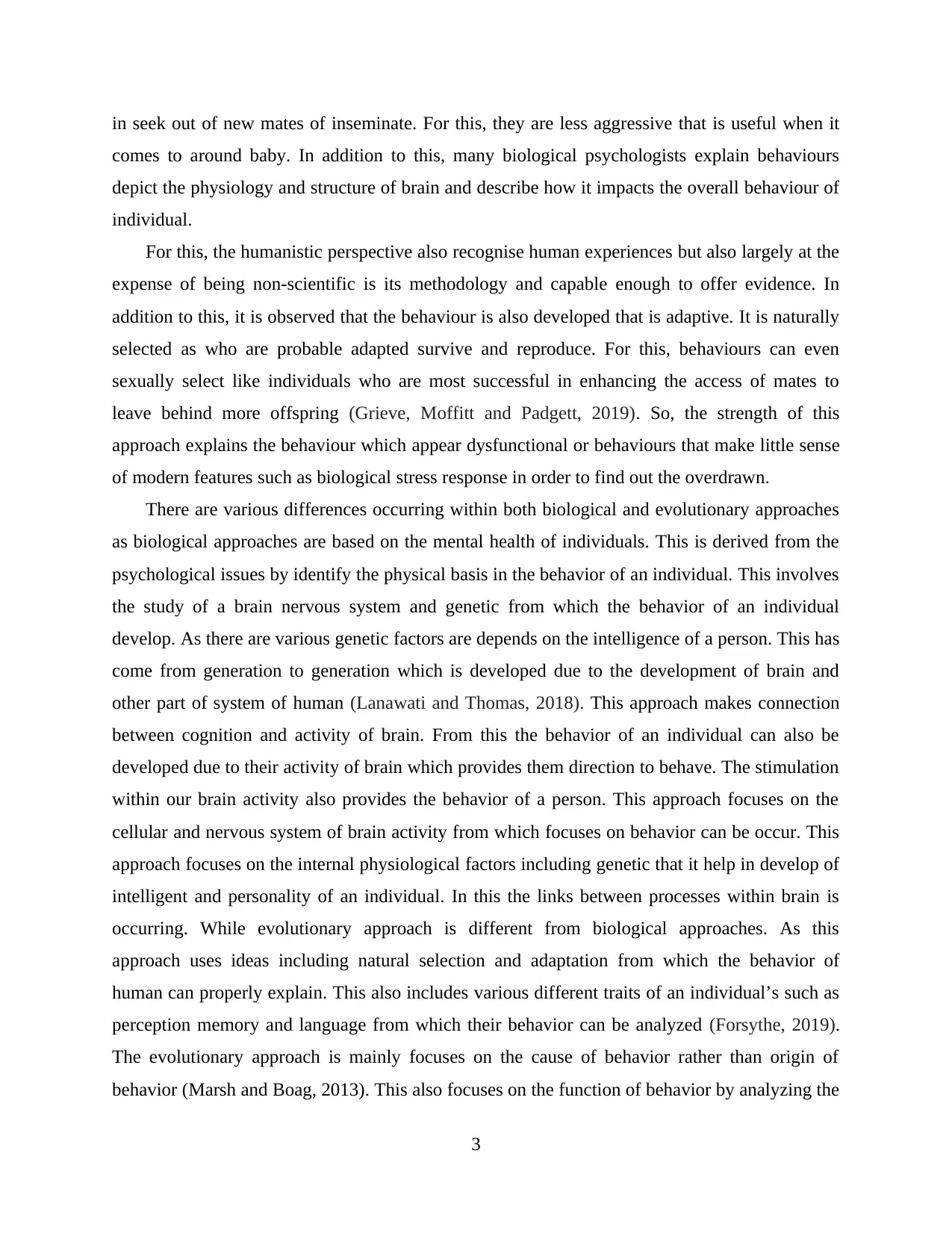
in seek out of new mates of inseminate. For this, they are less aggressive that is useful when it
comes to around baby. In addition to this, many biological psychologists explain behaviours
depict the physiology and structure of brain and describe how it impacts the overall behaviour of
individual.
For this, the humanistic perspective also recognise human experiences but also largely at the
expense of being non-scientific is its methodology and capable enough to offer evidence. In
addition to this, it is observed that the behaviour is also developed that is adaptive. It is naturally
selected as who are probable adapted survive and reproduce. For this, behaviours can even
sexually select like individuals who are most successful in enhancing the access of mates to
leave behind more offspring (Grieve, Moffitt and Padgett, 2019). So, the strength of this
approach explains the behaviour which appear dysfunctional or behaviours that make little sense
of modern features such as biological stress response in order to find out the overdrawn.
There are various differences occurring within both biological and evolutionary approaches
as biological approaches are based on the mental health of individuals. This is derived from the
psychological issues by identify the physical basis in the behavior of an individual. This involves
the study of a brain nervous system and genetic from which the behavior of an individual
develop. As there are various genetic factors are depends on the intelligence of a person. This has
come from generation to generation which is developed due to the development of brain and
other part of system of human (Lanawati and Thomas, 2018). This approach makes connection
between cognition and activity of brain. From this the behavior of an individual can also be
developed due to their activity of brain which provides them direction to behave. The stimulation
within our brain activity also provides the behavior of a person. This approach focuses on the
cellular and nervous system of brain activity from which focuses on behavior can be occur. This
approach focuses on the internal physiological factors including genetic that it help in develop of
intelligent and personality of an individual. In this the links between processes within brain is
occurring. While evolutionary approach is different from biological approaches. As this
approach uses ideas including natural selection and adaptation from which the behavior of
human can properly explain. This also includes various different traits of an individual’s such as
perception memory and language from which their behavior can be analyzed (Forsythe, 2019).
The evolutionary approach is mainly focuses on the cause of behavior rather than origin of
behavior (Marsh and Boag, 2013). This also focuses on the function of behavior by analyzing the
3
comes to around baby. In addition to this, many biological psychologists explain behaviours
depict the physiology and structure of brain and describe how it impacts the overall behaviour of
individual.
For this, the humanistic perspective also recognise human experiences but also largely at the
expense of being non-scientific is its methodology and capable enough to offer evidence. In
addition to this, it is observed that the behaviour is also developed that is adaptive. It is naturally
selected as who are probable adapted survive and reproduce. For this, behaviours can even
sexually select like individuals who are most successful in enhancing the access of mates to
leave behind more offspring (Grieve, Moffitt and Padgett, 2019). So, the strength of this
approach explains the behaviour which appear dysfunctional or behaviours that make little sense
of modern features such as biological stress response in order to find out the overdrawn.
There are various differences occurring within both biological and evolutionary approaches
as biological approaches are based on the mental health of individuals. This is derived from the
psychological issues by identify the physical basis in the behavior of an individual. This involves
the study of a brain nervous system and genetic from which the behavior of an individual
develop. As there are various genetic factors are depends on the intelligence of a person. This has
come from generation to generation which is developed due to the development of brain and
other part of system of human (Lanawati and Thomas, 2018). This approach makes connection
between cognition and activity of brain. From this the behavior of an individual can also be
developed due to their activity of brain which provides them direction to behave. The stimulation
within our brain activity also provides the behavior of a person. This approach focuses on the
cellular and nervous system of brain activity from which focuses on behavior can be occur. This
approach focuses on the internal physiological factors including genetic that it help in develop of
intelligent and personality of an individual. In this the links between processes within brain is
occurring. While evolutionary approach is different from biological approaches. As this
approach uses ideas including natural selection and adaptation from which the behavior of
human can properly explain. This also includes various different traits of an individual’s such as
perception memory and language from which their behavior can be analyzed (Forsythe, 2019).
The evolutionary approach is mainly focuses on the cause of behavior rather than origin of
behavior (Marsh and Boag, 2013). This also focuses on the function of behavior by analyzing the
3
Paraphrase This Document
Need a fresh take? Get an instant paraphrase of this document with our AI Paraphraser
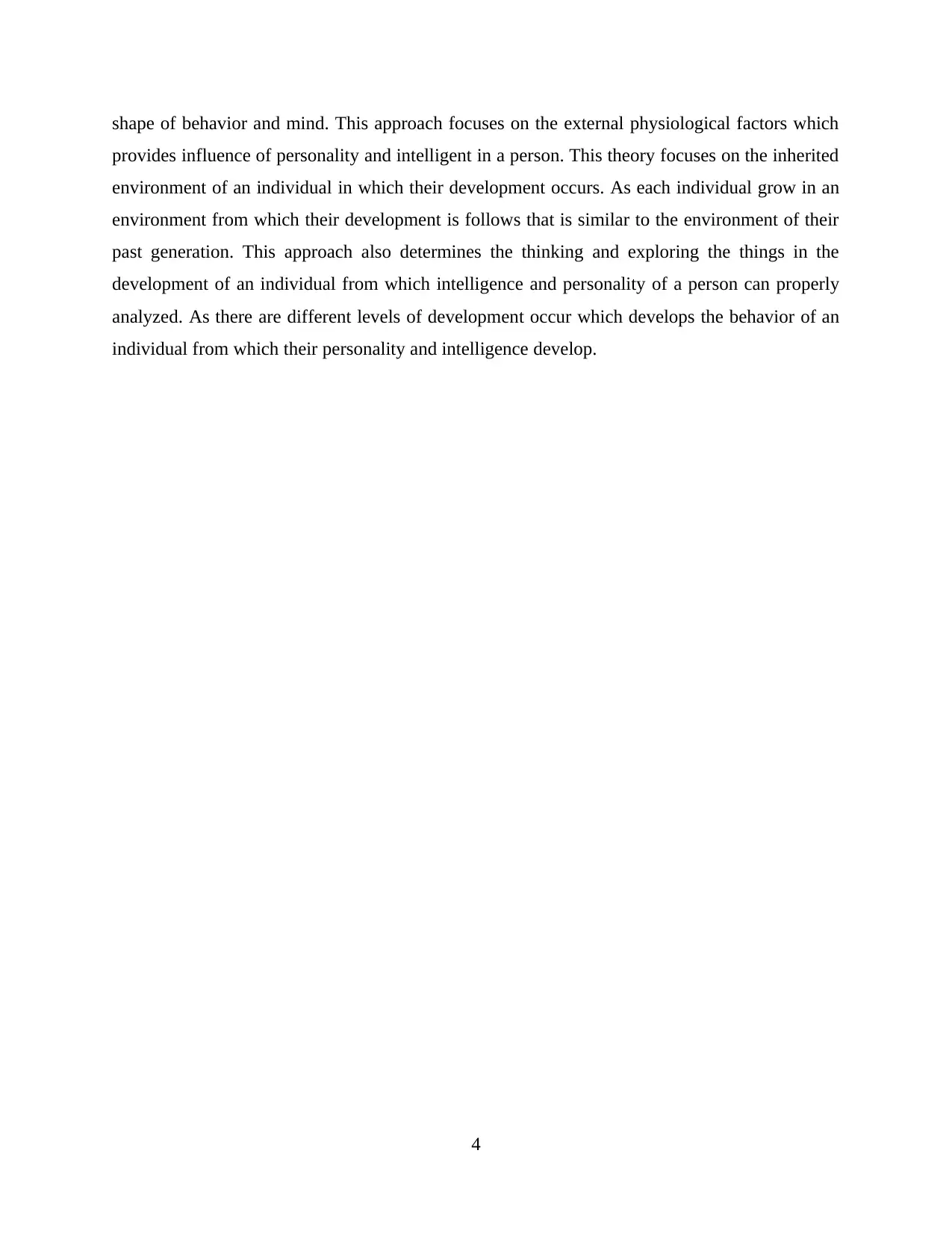
shape of behavior and mind. This approach focuses on the external physiological factors which
provides influence of personality and intelligent in a person. This theory focuses on the inherited
environment of an individual in which their development occurs. As each individual grow in an
environment from which their development is follows that is similar to the environment of their
past generation. This approach also determines the thinking and exploring the things in the
development of an individual from which intelligence and personality of a person can properly
analyzed. As there are different levels of development occur which develops the behavior of an
individual from which their personality and intelligence develop.
4
provides influence of personality and intelligent in a person. This theory focuses on the inherited
environment of an individual in which their development occurs. As each individual grow in an
environment from which their development is follows that is similar to the environment of their
past generation. This approach also determines the thinking and exploring the things in the
development of an individual from which intelligence and personality of a person can properly
analyzed. As there are different levels of development occur which develops the behavior of an
individual from which their personality and intelligence develop.
4
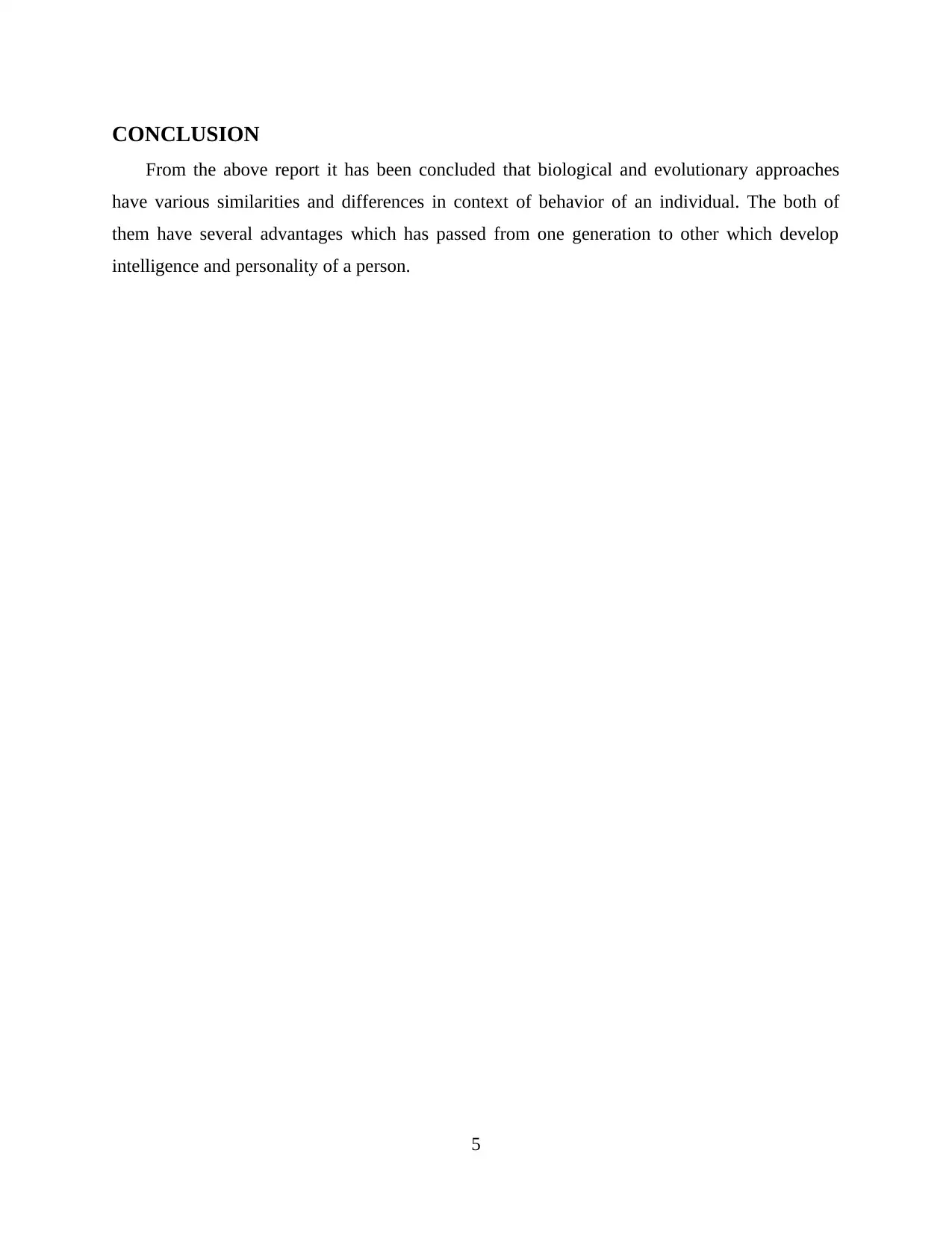
CONCLUSION
From the above report it has been concluded that biological and evolutionary approaches
have various similarities and differences in context of behavior of an individual. The both of
them have several advantages which has passed from one generation to other which develop
intelligence and personality of a person.
5
From the above report it has been concluded that biological and evolutionary approaches
have various similarities and differences in context of behavior of an individual. The both of
them have several advantages which has passed from one generation to other which develop
intelligence and personality of a person.
5
⊘ This is a preview!⊘
Do you want full access?
Subscribe today to unlock all pages.

Trusted by 1+ million students worldwide
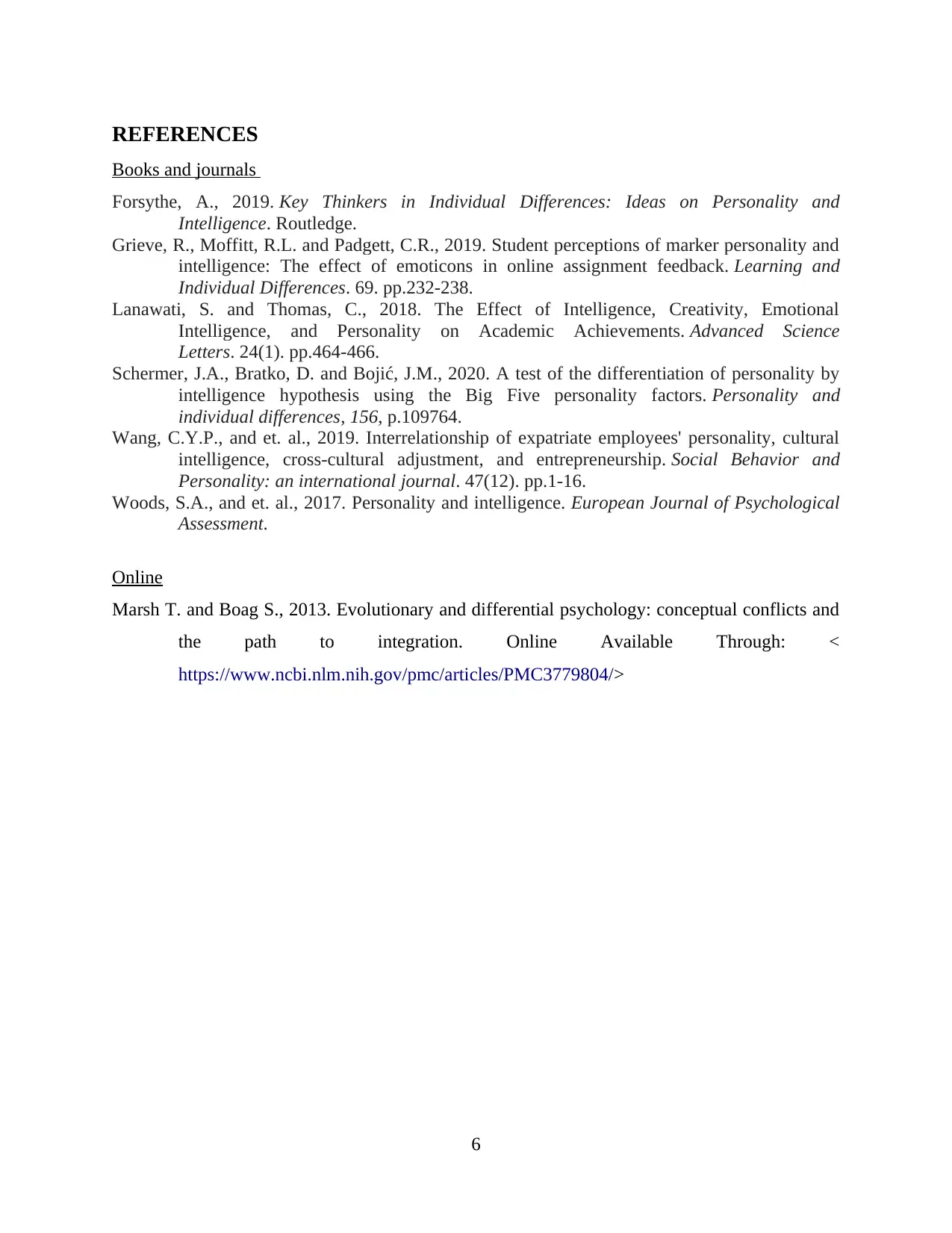
REFERENCES
Books and journals
Forsythe, A., 2019. Key Thinkers in Individual Differences: Ideas on Personality and
Intelligence. Routledge.
Grieve, R., Moffitt, R.L. and Padgett, C.R., 2019. Student perceptions of marker personality and
intelligence: The effect of emoticons in online assignment feedback. Learning and
Individual Differences. 69. pp.232-238.
Lanawati, S. and Thomas, C., 2018. The Effect of Intelligence, Creativity, Emotional
Intelligence, and Personality on Academic Achievements. Advanced Science
Letters. 24(1). pp.464-466.
Schermer, J.A., Bratko, D. and Bojić, J.M., 2020. A test of the differentiation of personality by
intelligence hypothesis using the Big Five personality factors. Personality and
individual differences, 156, p.109764.
Wang, C.Y.P., and et. al., 2019. Interrelationship of expatriate employees' personality, cultural
intelligence, cross-cultural adjustment, and entrepreneurship. Social Behavior and
Personality: an international journal. 47(12). pp.1-16.
Woods, S.A., and et. al., 2017. Personality and intelligence. European Journal of Psychological
Assessment.
Online
Marsh T. and Boag S., 2013. Evolutionary and differential psychology: conceptual conflicts and
the path to integration. Online Available Through: <
https://www.ncbi.nlm.nih.gov/pmc/articles/PMC3779804/>
6
Books and journals
Forsythe, A., 2019. Key Thinkers in Individual Differences: Ideas on Personality and
Intelligence. Routledge.
Grieve, R., Moffitt, R.L. and Padgett, C.R., 2019. Student perceptions of marker personality and
intelligence: The effect of emoticons in online assignment feedback. Learning and
Individual Differences. 69. pp.232-238.
Lanawati, S. and Thomas, C., 2018. The Effect of Intelligence, Creativity, Emotional
Intelligence, and Personality on Academic Achievements. Advanced Science
Letters. 24(1). pp.464-466.
Schermer, J.A., Bratko, D. and Bojić, J.M., 2020. A test of the differentiation of personality by
intelligence hypothesis using the Big Five personality factors. Personality and
individual differences, 156, p.109764.
Wang, C.Y.P., and et. al., 2019. Interrelationship of expatriate employees' personality, cultural
intelligence, cross-cultural adjustment, and entrepreneurship. Social Behavior and
Personality: an international journal. 47(12). pp.1-16.
Woods, S.A., and et. al., 2017. Personality and intelligence. European Journal of Psychological
Assessment.
Online
Marsh T. and Boag S., 2013. Evolutionary and differential psychology: conceptual conflicts and
the path to integration. Online Available Through: <
https://www.ncbi.nlm.nih.gov/pmc/articles/PMC3779804/>
6
1 out of 7
Related Documents
Your All-in-One AI-Powered Toolkit for Academic Success.
+13062052269
info@desklib.com
Available 24*7 on WhatsApp / Email
![[object Object]](/_next/static/media/star-bottom.7253800d.svg)
Unlock your academic potential
Copyright © 2020–2026 A2Z Services. All Rights Reserved. Developed and managed by ZUCOL.





